When I came to Kyiv in 2013 to study journalism, nearly every conversation about the future among my fellow young Ukrainians eventually came down to one question: How to leave the country for a chance of a better life.
Back then, there was no war, no daily attacks or funerals of friends killed by Russia. And yet I remember that time as more hopeless.
It was the era of pro-Russian, autocrat-aspiring President Viktor Yanukovych, marked by widespread corruption and impunity poisoning the country. For young people with their whole life ahead of them, it was hard to see anything worth staying for.
Soon, everything changed. It got even worse.
On Nov. 21, 2013, Yanukovych shattered the last glimmer of hope for Ukrainian youth by refusing to sign an association agreement with the European Union, steering the country away from its Western-oriented democratic path and back toward authoritarian Russia.
For young Ukrainians like myself, that decision was like a punch in the gut.
So in the best tradition of Ukrainian resistance, in the evening of that same day, several hundred people, many of them very young, gathered on Kyiv’s main Independence Square, or Maidan Nezalezhnosti, in protest of Yanukovych’s decision.
When my peers and I arrived at our dormitory after classes that day, we were overwhelmed with excitement, following every development on social media. And then, one of us finally said, “Should we go, too?”
We jumped into a taxi and spent the rest of the night in central Kyiv, under rain, with a group of people who cared. It started to feel like hope.
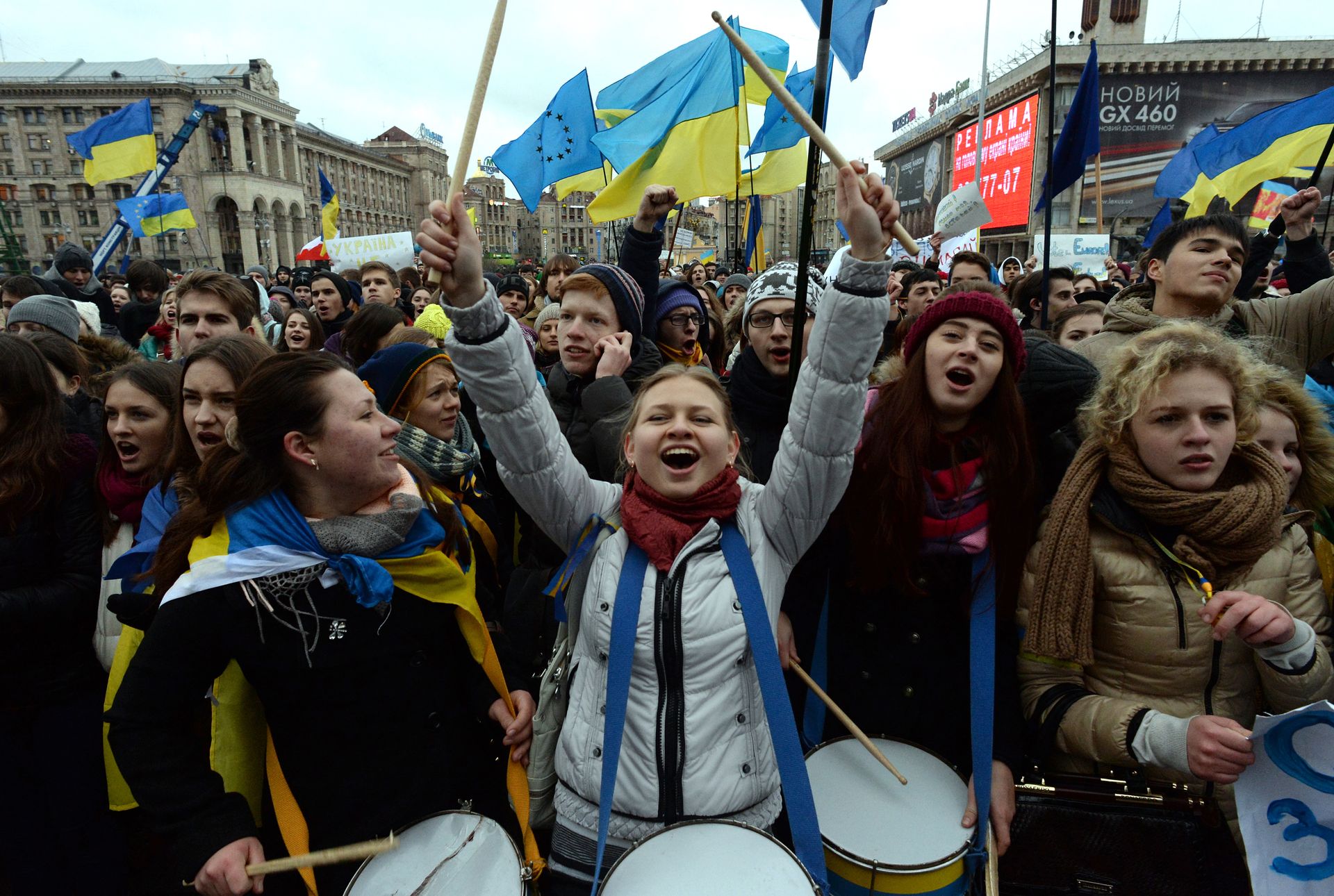 Students during the EuroMaidan Revolution in Kyiv, Ukraine, on Nov. 26, 2013, the third day of protests against the government’s decision to scrap a key pact with the European Union. (Vasily Maximov / AFP via Getty Images)
Students during the EuroMaidan Revolution in Kyiv, Ukraine, on Nov. 26, 2013, the third day of protests against the government’s decision to scrap a key pact with the European Union. (Vasily Maximov / AFP via Getty Images)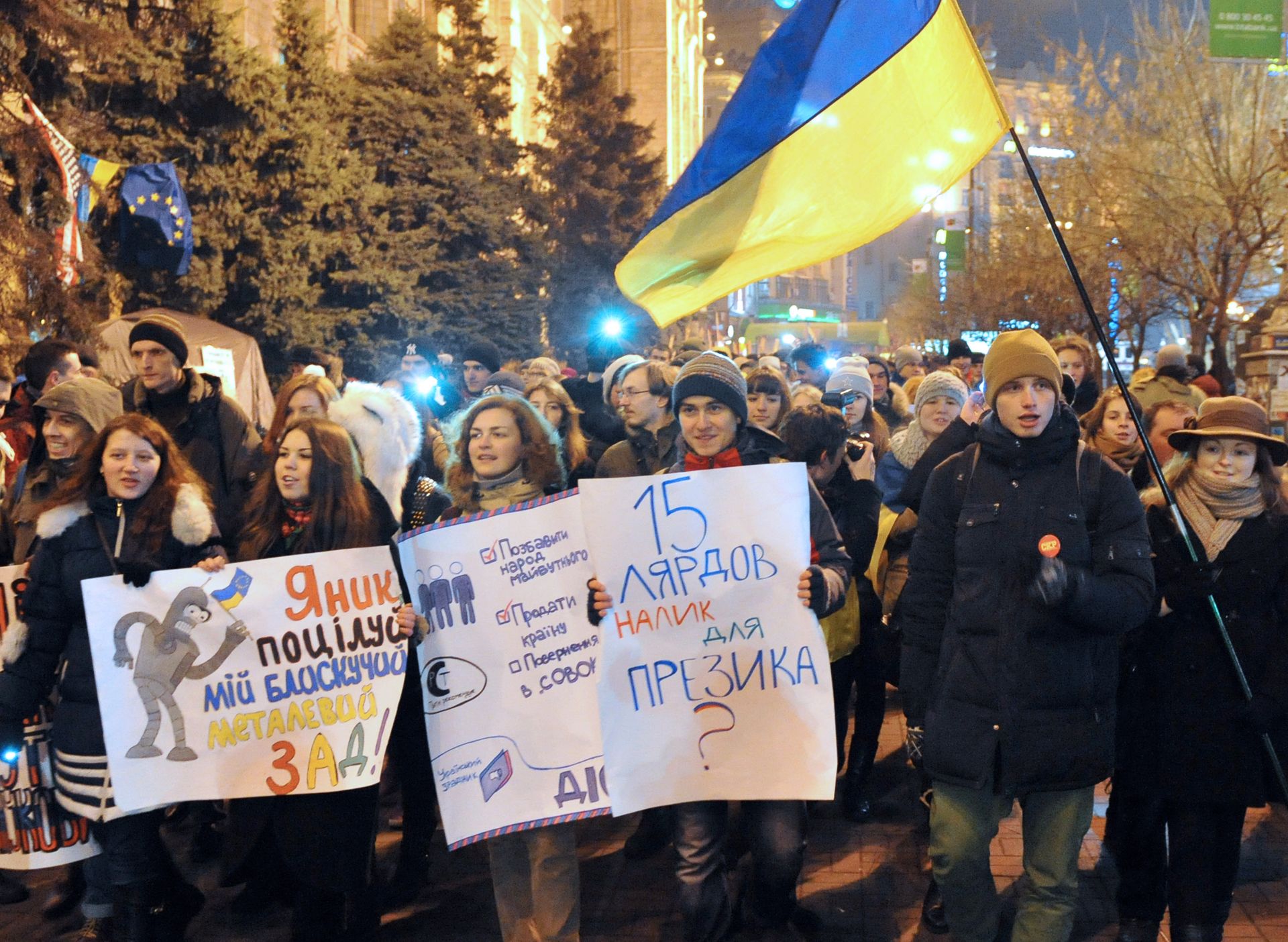
Students hold placards during the EuroMaidan Revolution at the Independence Square in Kyiv, Ukraine, on Dec. 19, 2013. (Yuriy Dyachyshyn / AFP via Getty Images)
That was the beginning of the EuroMaidan Revolution, which would in the ensuing months prove to be the most consequential event in the history of independent Ukraine.
It was also one of the most consequential events for me personally.
I attended protests on most of the days throughout the three-month revolution. I skipped classes and instead headed to the protest camp to make sandwiches for protesters in the freezing cold.
I kept going back, first and foremost, because I wanted to be part of a historic movement standing up for democratic values and against tyranny.
But I also simply liked being there.
The protest camp felt like an island of some utopian Ukrainian future. It was surrounded by a makeshift fence but it wasn’t only the physical barrier that separated it from the rest of central Kyiv. As soon as you entered, it felt like a different world — with its own rules, culture, and atmosphere.
Most people there spoke Ukrainian when many, if not most Ukrainians elsewhere in Kyiv spoke Russian — courtesy of centuries of Moscow’s oppressive policies. “Excuse me” and “Thank you” were heard everywhere — in a country still shedding the Soviet habit of yelling at strangers. There was a common understanding of everyone’s personal responsibility to keep the area clean. Despite the constant threats of riot police raids, I felt safe there — because I knew I was around my people — united by one purpose and all sacrificing for it. It was a better Ukraine in all senses.
It was the EuroMaidan Revolution that made me want to stay in Ukraine and be part of the generation that makes it a better place. And I wasn’t alone.
The revolution culminated in extreme violence, with law enforcement firing at unarmed protesters and killing over a hundred people. The bloodshed prompted parliament — including members of Yanukovych's own party — to condemn the crackdown, forcing him to flee hastily to Russia.
What followed were years of Ukraine’s transformation — rediscovering our identity as a nation, experiencing a true cultural renaissance after centuries of oppression, launching anti-corruption reforms and new mechanisms to hold authorities accountable, digitizing a wide range of services to make people’s lives easier, and cultivating a civil society where civic duty is an everyday responsibility, not a once-in-a-decade event.
In less than a decade, Ukraine went from a country many wanted to escape to one full of opportunity and hope.
“Together and till the end” — and it gave me chills, just like it did a decade ago.
Things weren’t perfect. Anti-corruption institutions were still very young. The key reform of the judicial system kept being dragged. There was still corruption and those in power seeking opportunity for revenge. A lot of work was still ahead. But what I experienced at the revolution’s protest camp didn’t seem so utopian anymore.
When Russia's full-scale invasion started in 2022, priorities shifted and everything but the struggle against Russian aggression had to be put on pause. It was the right thing to do because the entire existence of our country as an independent state was — and still is — at stake.
So in more than 3.5 years of the full-scale war, even when reforms stalled, even when injustice was clear, even when those in power abused it, the Ukrainian society chose to not exercise its protesting muscle. It remained focused on unity, on resisting Russia together, and maintaining the picture-perfect image of a resilient Ukraine for our supporters abroad.
They remain key priorities. But this week, another one was added to the list: reminding the Ukrainian government that Ukraine’s democratic aspirations — won in blood during the EuroMaidan Revolution — haven’t gone anywhere.
On July 22, Ukraine’s parliament passed a bill destroying the independence of Ukraine’s key anti-corruption institutions. The very institutions that were established as part of the country’s transformation following the revolution.
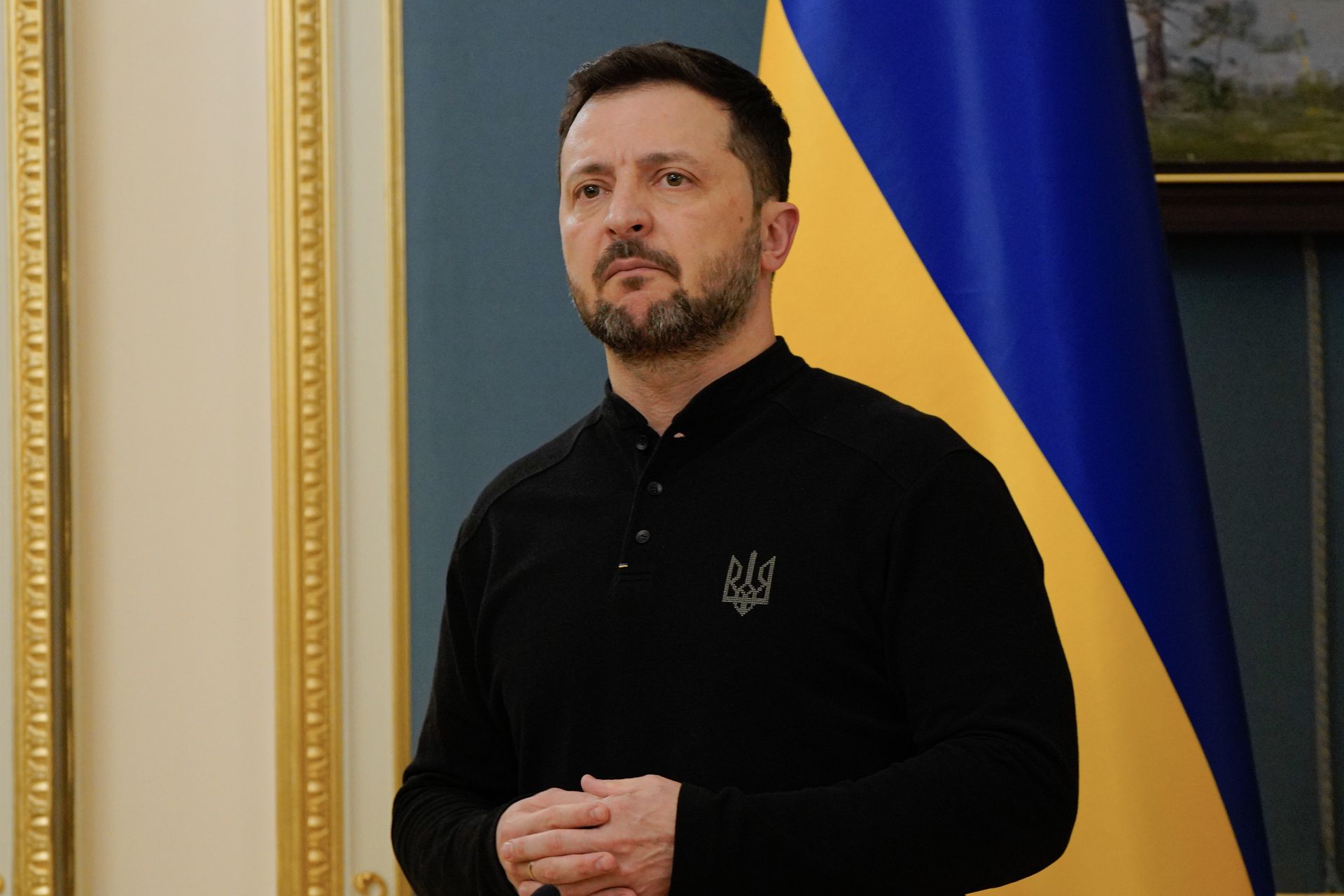
President Volodymyr Zelensky answers journalists’ questions during a press conference in Kyiv, Ukraine, on April 4, 2025. (Ihor Kuznietsov / Novyny LIVE / Global Images Ukraine via Getty Images)
The scenes in the parliament during voting — with cheers and applause as reforms were being destroyed — reminded me of the ugliest days of Yanukovych’s era.
What happened next revealed a habit many Ukrainians weren’t sure they still had: that same evening, people — most of them very young — gathered in central Kyiv for a peaceful protest against the decision.
As I approached the square sitting almost next to the Presidential Office, I saw vibrant young people rushing to join the protest. I couldn’t help but compare it to my own experience 12 years ago. Then I heard the chant that had endured from those days — “Together and till the end” — and it gave me chills, just like it did a decade ago.
There are many parallels I can draw between these protests, but there are also some important distinctions.
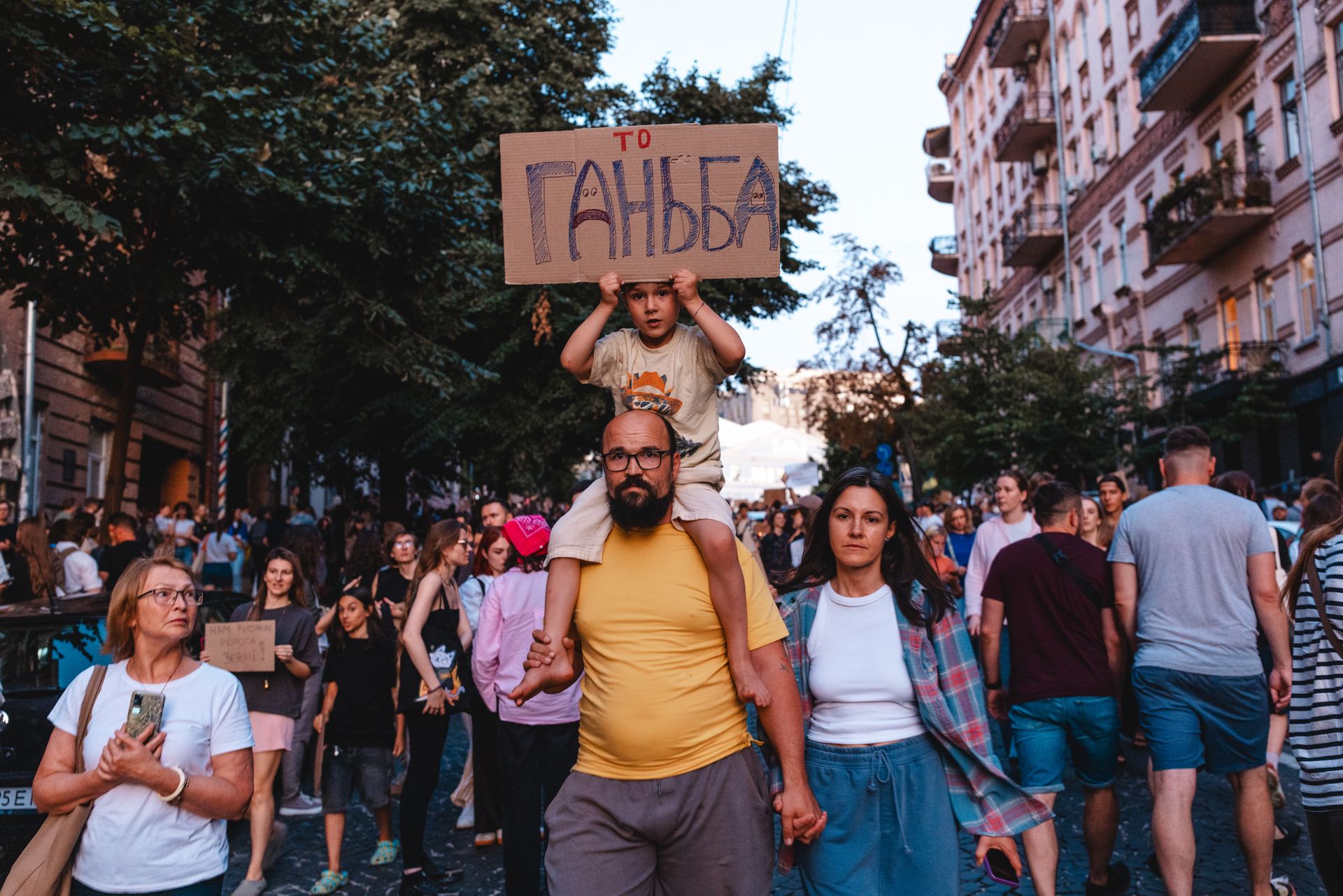
Protesters hold placards during a rally in Kyiv, Ukraine, on July 23, 2025, against a law that destroys the independence of Ukraine's key anti-corruption institutions. (Arsen Dzodzaiev / Global Images Ukraine via Getty Images)
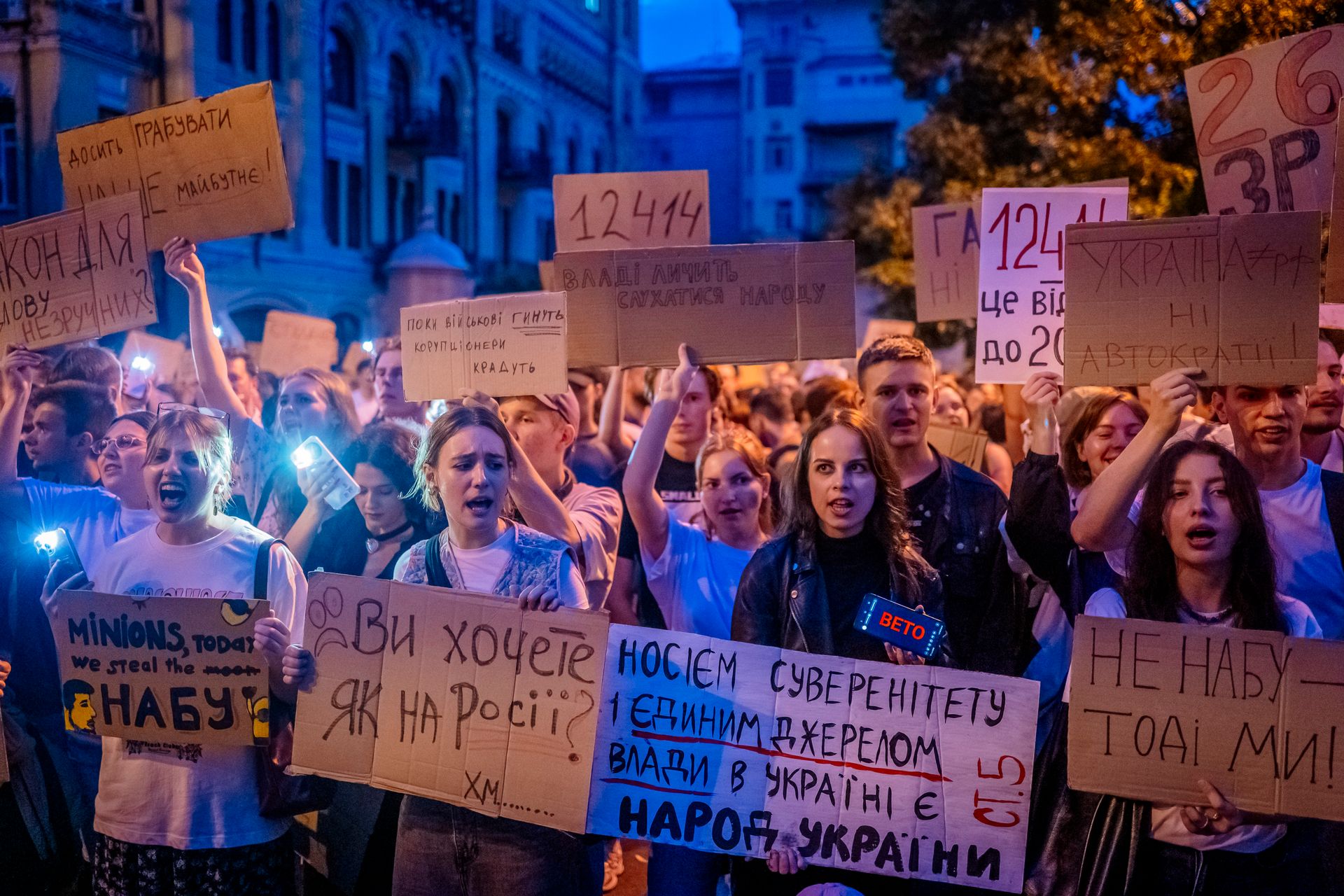
Protesters hold placards and turn on flashlights during a rally in Kyiv, Ukraine, on July 22, 2025. (Dan Bashakov / Global Images Ukraine via Getty Images)
Unlike in November 2013, it wasn’t hundreds but thousands of angry Ukrainians who took to the streets on the first day this time. They were way more organized and better prepared — carrying Ukrainian flags and witty signs. They know better than to give center stage to opposition politicians looking to capitalize on the demonstrations.
Seeing this evolution of Ukrainian society made me emotional and very proud. All these years of standing up on squares and then on the battlefield weren’t for nothing if this is what Ukraine is now.
That same day, right after the first protest, President Volodymyr Zelensky signed the controversial bill — which the protesters had urged him to veto — into law.
The next day, July 23, the demonstration happened again — this time with about three times more people joining. Today, July 24, people will gather once more. And something tells me they won’t stop demonstrating until they are truly heard.
On July 24, Zelensky finally backed down. He submitted a new draft law claiming to restore the independence of Ukraine’s anti-corruption agencies.
I don’t know whether the bill will ultimately pass, whether any new contentious amendments will be made, but what I do know is that the path Ukraine set upon during the EuroMaidan Revolution — and the sacrifices it has made and continues to make for it — isn’t something any president can pause or reverse.
Power in Ukraine belongs to its people. That’s what our Constitution says. That’s what 18-year-olds are proving in squares across the country today.
The last time I checked, the Ukrainian people have made their choice to grow into a full-blown democracy very clear — time and again. And if anyone in the President’s Office has forgotten that, they only need to look out the window for a reminder.
 Students during the EuroMaidan Revolution in Kyiv, Ukraine, on Nov. 26, 2013, the third day of protests against the government’s decision to scrap a key pact with the European Union. (Vasily Maximov / AFP via Getty Images)
Students during the EuroMaidan Revolution in Kyiv, Ukraine, on Nov. 26, 2013, the third day of protests against the government’s decision to scrap a key pact with the European Union. (Vasily Maximov / AFP via Getty Images)



Definitely I recommend to host your instance outside of places with the shitty laws. Not sure how much that'll do for you, but it'll at least buy you some time.